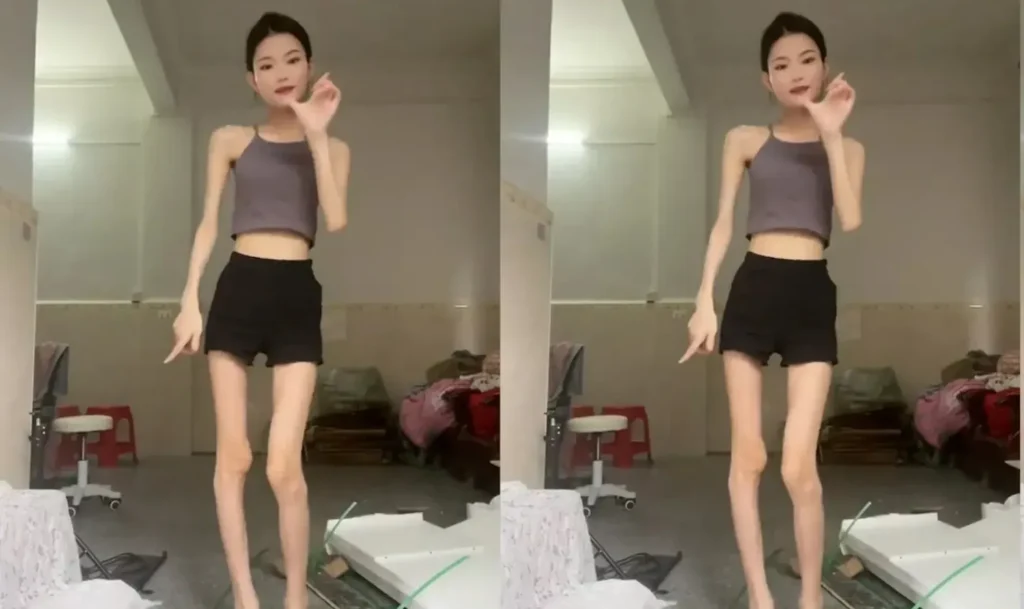SkinnyTok has emerged as a viral weight-loss trend on social media, particularly on TikTok, capturing the attention of users with its focus on extreme thinness. This trend, while often presented alongside healthy living tips and nutrition advice, has raised significant concerns about disordered eating and the potential harm it inflicts on young minds. Experts warn that the content associated with SkinnyTok frequently promotes harmful practices that prioritize drastic weight loss over overall well-being. As individuals chase the idea of getting as thin as possible, they may inadvertently harm their physical health through food deprivation and neglecting proper nutrition. The allure of these weight loss trends underscores the urgent need for balanced, mindful approaches to nutrition and wellness amid the proliferation of social media content.
The phenomenon known as “SkinnyTok” reflects a broader societal obsession with extreme dieting and slenderness that continues to gain traction online. This movement, while presenting itself as a source for fitness motivation and healthy living, can often lead to dangerous behaviors associated with unhealthy eating habits. With a growing number of individuals seeking quick solutions to weight loss, the consequences of these actions can devastatingly affect their mental and physical health. Instead of fostering a culture of nourishment and balanced nutrition, many find themselves ensnared in cycles of disordered eating patterns. As social platforms continue to amplify these messages, it becomes crucial to pivot towards supportive environments that promote wholesome habits and realistic body image standards.
Understanding the SkinnyTok Phenomenon
SkinnyTok has quickly become a viral trend on social media platforms, leaving many to wonder about its impact on young audiences. With over 60,000 videos associated with the hashtag, influencers are actively sharing their weight-loss journeys and strategies. This trend, while seemingly innocuous in its promotion of healthy living tips, often veers into dangerous territory, glorifying extreme measures for achieving physical ideals. As creators showcase their approaches to weight loss, it’s crucial for viewers to sift through the information critically, discerning between healthy behaviors and harmful practices.
Experts have raised alarms over the potential harm associated with SkinnyTok, warning about the implications of promoting unrealistic body standards. The push for rapid weight loss can lead to unhealthy habits and disordered eating, where individuals may engage in starvation diets or extreme caloric restrictions. Understanding this phenomenon requires a conversation about body positivity, self-acceptance, and the importance of prioritizing overall health, rather than mere numbers on a scale.
The Danger of Disordered Eating
As the SkinnyTok trend gains traction, the risk of disordered eating among adolescents and young adults increases significantly. Influencers often present edited images and curated clips that imply success through extreme dieting, neglecting the vital aspect of nutritional balance. Dr. Brett Osborn highlights that such public endorsements of frailty can lead to severe health consequences, including impaired cognitive function and physical deterioration. This reality reflects a troubling narrative that equates thinness with beauty, overshadowing the importance of nurturing one’s well-being.
Disordered eating behaviors can manifest in various ways, from binge eating to chronic dieting. As viewers engage with these harmful content streams, they may unknowingly adopt unhealthy attitudes toward food and body image. The role of social media algorithms in amplifying these messages cannot be overlooked, as repeated exposure to idealized body types fosters unrealistic expectations. It’s paramount for individuals to recognize the signs of potential eating disorders, and to seek support where necessary, ensuring that health remains the focal point of their relationship with food.
Promoting Healthy Living Tips in the Age of Social Media
In light of the concerning trends represented by SkinnyTok, promoting healthy living tips has never been more vital. Social media offers an unprecedented platform for sharing nutritional advice and wellness practices that prioritize overall well-being. By encouraging followers to embrace nourishing foods, regular physical activity, and mental health awareness, influencers can effect positive change and counteract the malicious effects of harmful content. The challenge lies in creating a responsible environment where the emphasis is placed on health rather than a thin image.
To foster a healthy lifestyle, it’s essential to adopt a comprehensive approach that includes mindful eating, emotional well-being, and community support. Sharing recipes, highlighting diverse body types, and debunking the myths tied to weight loss can empower individuals to make informed choices. Social media can indeed be harnessed for good, by utilizing platforms to inspire users to cultivate healthy habits that align with their values, rather than succumb to pressures that might jeopardize their health.
Identifying and Combating Social Media Harm
Social media holds significant power in shaping perceptions about body image and health, but it’s essential to recognize its potential for harm. SkinnyTok’s popularity serves as a stark reminder of how quickly trends can spiral, particularly when they glorify harmful practices. Experts emphasize that it’s crucial to critically evaluate the information consumed online, advocating for an environment where healthy living is understood through a balanced, informed lens. This means addressing not just the content, but also fostering discussions on the effects of these trends on our mental health.
Combatting the harmful effects of social media requires collective responsibility. Influencers and platforms must take accountability for the content they create and promote. Encouraging users to engage with diverse, body-positive messages can create a more supportive atmosphere. Moreover, educational initiatives focused on media literacy can empower individuals to discern healthy behaviors from toxic narratives, ultimately leading to a culture where physical and mental health are prioritized over unrealistic standards.
The Role of Nutrition Advice in Healthy Living
Nutrition advice is a cornerstone of healthy living and plays a critical role in counteracting trends like SkinnyTok. Experts highlight the importance of understanding nutrition’s impact on both physical and mental health, emphasizing balanced meals that fuel the body rather than deprive it. Proper nutrition can enhance vitality, improve mood, and support overall wellness, steering individuals away from the damaging pursuit of extreme weight loss. Accessible resources and sound nutritional guidance are vital for empowering individuals to make healthier choices.
Moreover, integrating education about macro and micronutrients into everyday conversations can demystify the subject of nutrition for many. Whether through social media, workshops, or community events, spreading awareness about the significance of food choices and their effects on health can lead to more informed populations. This shift can help combat the appeal of trends that promote deprivation over nourishment, fostering a culture that values health as a holistic experience.
Supporting Those Struggling with Disordered Eating
It’s essential to recognize and support individuals who may be struggling with disordered eating, particularly in the context of popular trends like SkinnyTok. As the visibility of these patterns rises, the importance of discussing mental health and well-being becomes paramount. Creating safe spaces where individuals can open up about their experiences is crucial in mitigating the crisis surrounding disordered eating. Experts recommend that anyone showing signs should seek professional support, emphasizing that treatment options are available and effective.
Awareness campaigns aimed at identifying eating disorders and the resources available can play a significant role in saving lives. Encouraging individuals to seek help, share their stories, and connect with qualified professionals can empower them on their journey towards recovery. Social media platforms can also engage in promoting mental health resources, fostering a community where healing is prioritized over extreme dieting trends, ultimately leading to a healthier, more supportive online environment.
Understanding Health vs. Weight in Young Adults
As discussions around SkinnyTok rise, a critical examination of the distinction between health and weight in young adults is necessary. It’s vital to understand that low body weight does not intrinsically correlate with good health. Dr. Osborn points out the crucial need to shift the conversation from extreme thinness to vibrant health, focusing on strength, function, and overall well-being. This shift can alleviate pressures on young adults who are heavily influenced by societal and media standards.
To promote a healthier perspective, it’s essential to encourage young adults to prioritize their physical and emotional health over numbers on a scale. Discussions about healthy habits—including strength training, balanced diets, and self-care—should be the forefront of health narratives. By reframing health as a multifaceted approach that values individual differences and unique body types, society can cultivate resilience and acceptance, steering the younger generation away from harmful influences like SkinnyTok.
The Influence of Social Media Algorithms on Health Messaging
Social media algorithms play a pivotal role in amplifying trends like SkinnyTok, often prioritizing content that resonates with users, regardless of its health implications. These algorithms can inadvertently create echo chambers that reinforce harmful behavior patterns, exposing users to a continuous stream of toxic messages about dieting and body image. Understanding how these algorithms function can empower users to take control of their feeds, seeking out positivity rather than negativity.
Engaging with content that promotes healthy living, and diversifying the types of messages consumed online, can counteract the dangers posed by narrow, harmful trends. Social media platforms have a responsibility to address these dynamics, promoting diverse voices that advocate for mental and physical wellness. Encouraging transparency and accountability among creators can foster a healthier online ecosystem, where individuals are inspired by progress and well-being rather than unrealistic portrayals of beauty.
Building a Positive Community Around Health and Wellness
Creating spaces that foster positive health and wellness communities can have a powerful impact in light of the challenges posed by trends like SkinnyTok. Emphasizing community support can encourage individuals to focus on well-being instead of falling into the traps set by harmful weight-loss narratives. Initiatives that promote group activities—such as cooking classes, fitness challenges, or mindfulness workshops—can foster connections and create environments where healthy behaviors flourish.
In addition, it’s paramount for influencers and public figures to use their platforms responsibly, promoting integrity and authenticity. By sharing genuine experiences and advocating for balanced approaches to health, they can inspire followers to cultivate their journeys with intention and self-love. Building a positive community revolves around inclusivity, celebrating body diversity, and placing a strong emphasis on mental health, ultimately breaking down the stigma surrounding discussions about eating disorders and bodily autonomy.
Frequently Asked Questions
What is SkinnyTok and how does it promote weight loss?
SkinnyTok is a trending hashtag on TikTok associated with various weight loss tips and methods. It often emphasizes extreme dieting practices aiming for rapid weight loss, which some influencers promote. However, experts warn that such approaches can lead to disordered eating and health issues by prioritizing thinness over holistic well-being.
Are the weight loss trends on SkinnyTok safe?
Many weight loss trends promoted on SkinnyTok can be dangerous. Experts caution that the focus on extreme thinness often disregards nutritional needs, leading to severe health consequences. Instead of following these trends, individuals should seek balanced nutrition advice and prioritize healthy living.
How does SkinnyTok contribute to disordered eating?
SkinnyTok can perpetuate disordered eating patterns by glorifying unhealthy methods of weight loss and promoting the idea that achieving extreme thinness is desirable. This can be particularly harmful to individuals with body image issues, as they may feel pressured to engage in risky behaviors to fit societal beauty standards.
What healthy living tips can I follow instead of the SkinnyTok trends?
Instead of extreme diets advocated by SkinnyTok, focus on healthy living tips such as balanced nutrition, regular physical activity, and mindful eating practices. Consulting with nutrition experts can provide personalized advice that supports both physical and mental wellness.
How can social media harm perceptions of body image related to SkinnyTok?
Social media platforms like TikTok amplify harmful messages around body image, especially from trends like SkinnyTok. The algorithms often promote content that glorifies extreme body modifications and may reinforce negative self-perception, increasing the risk of disordered eating and mental health issues.
What should I do if I notice signs of disordered eating influenced by SkinnyTok?
If you or someone you know is exhibiting signs of disordered eating, it is important to seek help from healthcare professionals. Therapy and treatment options are available to address underlying issues related to eating behaviors and body image affected by trends like SkinnyTok.
Can SkinnyTok affect young people’s health negatively?
Yes, SkinnyTok can negatively impact young people’s health by promoting malnutrition and unrealistic body standards. Such practices can lead to physical frailty, hormonal disruptions, and cognitive impairment, emphasizing the need for a balanced approach to health and nutrition.
| Key Points | Details |
|---|---|
| SkinnyTok Popularity | Over 60,000 videos discussing weight loss strategies under the hashtag #SkinnyTok on TikTok. |
| Expert Warnings | Doctors caution against the trend, linking it to disordered eating and severe health risks. |
| Physical Effects of Malnutrition | Consequences can include hair loss, fractures from low bone density, and impaired cognitive functions. |
| Misconceptions of Health | Low body weight is often mistakenly equated with good health, when it can lead to serious issues. |
| Focus on Healthy Living | Experts recommend prioritizing muscle building and a well-rounded approach to wellness. |
Summary
SkinnyTok is a trending weight-loss phenomenon on social media that has gained significant attention, but it raises serious health concerns. While it presents strategies for weight loss, experts highlight the risks associated with such extreme approaches, warning that they can lead to food deprivation and disordered eating. Emphasizing the value of mental and physical health, professionals recommend nurturing a balanced lifestyle rather than pursuing harmful diet fads touted by influencers. Overall, a healthy attitude towards food and nourishment is essential.



